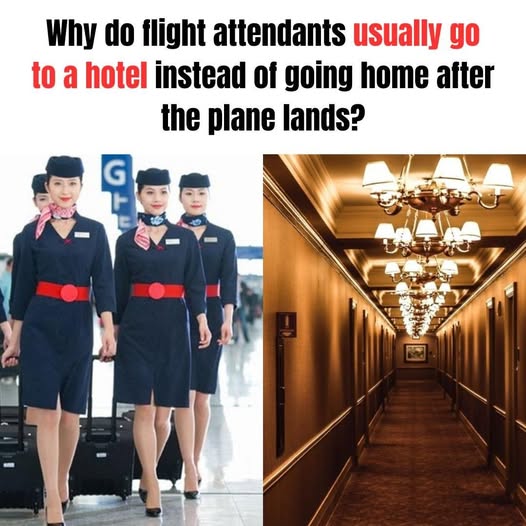Flight attendants rarely head straight home after their flights land. Instead, they usually check into a hotel. This is not just a matter of convenience but an essential part of their job, influenced by long working hours, aviation regulations, and the unique demands of their profession. Here’s why this practice is necessary and how it ensures the well-being of flight attendants and the safety of passengers.

Long and Exhausting Flight Schedules
Flight attendants often work on international or long-haul flights that can last for hours, sometimes stretching into double digits. These extended schedules involve more than just being on board—preparing for the flight, assisting passengers, and ensuring safety during the journey all require constant vigilance and energy. By the time the plane lands, flight attendants are typically both physically and mentally exhausted.
Staying at a hotel near the airport allows them to rest and recover before their next assignment. This downtime is critical for maintaining focus and readiness, especially when their next flight is scheduled within a short time frame. Proper rest helps them stay alert and perform their duties at their best, ensuring the comfort and safety of everyone on board.
Compliance with Regulated Rest Periods
The aviation industry is heavily regulated to ensure safety, and one of these regulations pertains to crew rest periods. Airlines and aviation authorities mandate minimum rest times between flights to prevent fatigue and ensure that crew members are fit to work.
Returning home after a flight could reduce the time flight attendants have to rest, especially if they face a long commute. Hotels near the airport provide a convenient option for them to maximize their regulated rest time. This arrangement helps them comply with industry standards and ensures they’re well-prepared for their next flight.
Layovers in Different Cities or Countries
Flight attendants frequently fly to destinations far from their home base. When they land in another city or country, going home isn’t an option. Instead, they stay in hotels arranged by the airline until their next flight.
These layovers can range from a few hours to several days. Airlines usually select hotels near the airport or in convenient locations, ensuring that the crew has easy access to rest and recovery. These accommodations are chosen with the crew’s needs in mind, offering quiet environments and amenities like blackout curtains and fitness facilities.
Staying in hotels during layovers not only ensures rest but also allows flight attendants to be ready for their next assignment without unnecessary stress or logistical challenges.
The Unique Nature of Their Work
A flight attendant’s job is unlike most other professions. Their schedules are irregular, often requiring them to work at odd hours, including overnight shifts. Unlike a traditional 9-to-5 job, their work depends on flight schedules that can change frequently.
Hotels offer flexibility and convenience that align with these unpredictable demands. They provide a consistent place for flight attendants to rest, no matter where their flight schedule takes them. This arrangement ensures they can maintain their health and performance levels, regardless of their work hours or location.
Convenience and Efficiency
Staying in hotels close to the airport minimizes travel time for flight attendants. After a long flight, commuting home can be both time-consuming and exhausting. Hotels eliminate this additional burden, allowing crew members to begin their rest period immediately.
This practice also benefits airlines by ensuring that their crew is nearby and readily available for their next assignment. In case of schedule changes or emergencies, having the crew close to the airport simplifies logistics and ensures smooth operations.
Prioritizing Health and Safety
Ultimately, staying in hotels is about safeguarding the health and safety of flight attendants and passengers. Fatigue can lead to errors, which is why rest is prioritized in the aviation industry. By staying in hotels, flight attendants can recharge physically and mentally, ensuring they are alert and capable of handling any situation during a flight.
Conclusion
Flight attendants staying in hotels instead of going home is a necessary part of their profession. Long and demanding flight schedules, strict rest regulations, frequent layovers, and the irregular nature of their work make hotels an ideal solution.
This practice is not just about convenience—it’s essential for maintaining their health, ensuring compliance with aviation safety standards, and providing passengers with the best possible service. By staying in hotels, flight attendants are better equipped to meet the challenges of their job while prioritizing safety and efficiency.
So, the next time you see a flight attendant heading to a hotel after landing, remember that this routine is a vital part of keeping them well-rested and ready to perform their critical role in the aviation industry.


